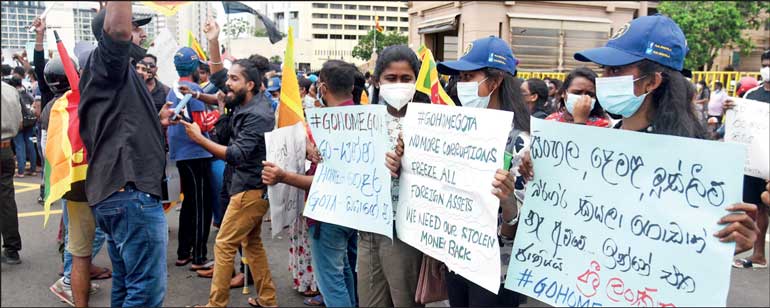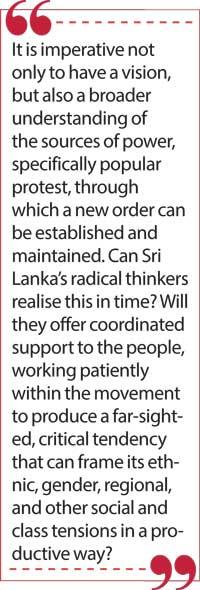Tuesday Feb 17, 2026
Tuesday Feb 17, 2026
Tuesday, 14 March 2023 00:00 - - {{hitsCtrl.values.hits}}

The implicit assumption is that the diverse sources of popular rebellion have taken on a life of their own - Pic by Ruwan Walpola
 For Sri Lanka’s political and economic establishment, the current moment is no doubt unnerving. In this context, there is an emerging style of commentary that focuses on critiquing or otherwise cautioning the Government led by Ranil Wickremesinghe for its poor optics. Many commentators of this type embrace the underlying assumptions about the necessity of the IMF policy package. But they also say, for example, do not delay Local Government Elections and let the people vent their frustration at the polls. Even among the elite there is dawning recognition that raw repression is unsustainable.
For Sri Lanka’s political and economic establishment, the current moment is no doubt unnerving. In this context, there is an emerging style of commentary that focuses on critiquing or otherwise cautioning the Government led by Ranil Wickremesinghe for its poor optics. Many commentators of this type embrace the underlying assumptions about the necessity of the IMF policy package. But they also say, for example, do not delay Local Government Elections and let the people vent their frustration at the polls. Even among the elite there is dawning recognition that raw repression is unsustainable.
But in this moment of ongoing upheaval, there is also fear; fear that the process of change might move too fast. The implicit assumption is that the diverse sources of popular rebellion have taken on a life of their own. They threaten to weaken the grip of those who continue to see themselves intellectually, if not politically, in control of Sri Lanka’s future. Accordingly, for the establishment and its experts, the next step is to downplay popular rebellion. Supposedly, the diverse protests opposing the current dispensation, especially the austerity that the Government is imposing on people, are the mindless reflex of the rabble. They are not the product of sophisticated philosophising by thinkers who claim to know what’s in the country’s best interest.
Nevertheless, it is precisely when the old order is collapsing that we must confront this elitist intellectual division of labour. We must trust the popular instincts and work through their contradictions patiently, rather than condemn, for example, the alleged naivete of student protestors, for example, from above. This is not a time for watching from the side lines, intellectually speaking. Rather, it demands active participation in the creative, difficult work of democracy in action. As the Marxist revolutionary Rosa Luxemburg argued, the people’s spontaneous struggles carry with them a weight that forces radical intellectuals to quickly catch up and consider the profound implications.
Thinking in rebellion
For the establishment, this is anathema. The idea that the people can reclaim their destiny is fine, up to a point. Beyond that, however, it becomes anarchy, threatening, for example, the economic liberalisation process—or “reform” as it is often mis-labelled—which is the real justification for a change in political regime. So, anything after the 9 July uprising, especially protest against the IMF policy package, is not helpful. In fact, it is supposedly counter-productive. In the crudest example yet, some in the highest levels of Government assert that continued protest will only dissuade the tourists who are now returning, bringing with them precious foreign exchange.
The complicity of intellectuals, however, is much more subtle than the knee-jerk, defensive gestures of those in power. Their thinking works in a much craftier way, through disavowal. They say that democracy must be saved but also that there is a limit to democracy. As the Marxist cultural critic Raymond Williams put it, “As so often, it picks up the story at a convenient point: at the point of response, sometimes violent, to repression; not at the repression itself. Even so, it is a point of view, and a familiar one” (“A Hundred Years of Culture and Anarchy,” reprinted in Culture and Materialism, p.6)
Moreover, other torturous arguments conflate the history of Sinhala Buddhist majoritarianism and anti-minority rioting with all forms of popular rebellion. To put it in a global context, far right mobs, such as the ones that stormed Washington DC on 6 January 2021 or Brasilia this year after Lula da Silva was elected, are not the same as popular movements resisting unpopular regimes. Nevertheless, some commentators see them all as an expression of irrational crowds. The same implicitly authoritarian style of thinking, that the masses are only having their strings pulled, is present even in those nationalist commentators who are ostensibly on the other side of the political divide. They, of course, interpret the people’s movement as an example of a Western conspiracy.
Either way, the shared assumption is that extra-parliamentary resistance is the precursor to a power grab. Whether the Janatha Vimukthi Peramuna (JVP), the Frontline Socialist Party (FSP), the Inter University Students’ Federation (IUSF), or other actors, all represent sectionalism in the guise of a new red menace.
But it is in the moment when the old order is breaking down that we must be able to think through protest, rather than reject it. Amid the global upheaval of the 1960s manifest in Britain, Raymond Williams argued in a brilliant way that we must avoid a dichotomous opposition between rebellion and thinking. As he put it through engaging with the late 19th century British working-class protests and conservative critic Matthew Arnold’s response: “It then matters very much whether those who believe in reason and in informed argument are able, within the noise of confrontation, to go on making the necessary distinctions” (“A Hundred Years…”, p.8).
Williams goes on to argue that the question is whether “…The defenders of reason and education become open to new and unfamiliar relationships, or instead relapse to their existing habits and privileges...” If intellectuals choose the latter, Williams, in contrast to Arnold’s distinction between culture and anarchy, argued that “For the culture which is then being defended is not excellence but familiarity, not the knowable but only the known values. And while people like that dominate and multiply, it will always be necessary to go again to Hyde Park.”
Sri Lanka had its own Hyde Park, Galle Face Green. That symbol of occupation inspired a generation. It was dismantled, but the memory lives on, and is reflected in diverse tendencies. These do not all align, as anyone with a deeper familiarity of the Left would argue, based on the distinction, for example, between the JVP and the FSP. But this is also a moment when those forces that in general see themselves as part of the leading edge of history, the Jacobins so to speak, must push back against elitist attempts to enshrine the constitution as a document of reaction. Specifically, the attempt to justify Ranil Wickremesinghe’s election through a delegitimised parliament, which clearly experienced a catastrophic loss of popular support in the aftermath of the 9 July uprising.
That manoeuvre was premised on the argument that the letter, as opposed to the spirit, of the law must prevail. In the aftermath of this break in history, progressive forces must rethink the constitution instead as a malleable instrument of popular sovereignty. The critical debate about the crisis and whether the people’s will is being exercised through existing formats of representation must be sustained.
Committing to the task of change
 It is in this context that we witness the greatest failure of all those who see themselves merely in terms of offering sage counsel to the powers that be. This is not a moment of stabilisation. This is a moment of terror, as Balasingham Skanthakumar has pointedly noted in his editorial for Polity, “Terror as Stability.” And it is the terror of the ruling class against the working people especially. For those who genuinely wish to avert greater social conflict, now is the time to remind the ruling class that it has shredded the previous social contract. It must accept a new one. This is not through the fault of the people. It is because of the error caused by those who drove Sri Lanka into its current desperate situation. And despite claims that a neoliberal reform process will break the crony capitalist hold of the Rajapaksas, or the various “mafias” that dominate state institutions, what is happening now is only entrenching the power of global finance capital and its comprador allies.
It is in this context that we witness the greatest failure of all those who see themselves merely in terms of offering sage counsel to the powers that be. This is not a moment of stabilisation. This is a moment of terror, as Balasingham Skanthakumar has pointedly noted in his editorial for Polity, “Terror as Stability.” And it is the terror of the ruling class against the working people especially. For those who genuinely wish to avert greater social conflict, now is the time to remind the ruling class that it has shredded the previous social contract. It must accept a new one. This is not through the fault of the people. It is because of the error caused by those who drove Sri Lanka into its current desperate situation. And despite claims that a neoliberal reform process will break the crony capitalist hold of the Rajapaksas, or the various “mafias” that dominate state institutions, what is happening now is only entrenching the power of global finance capital and its comprador allies.
The professional middle classes, and the parties that chase after their votes and support, could very well waver, even if they enter power through a new Government. They are divided between their own narrow interests and the broader need to produce a self-sufficient development model that contradicts many of their prior aspirations to achieving a higher status through imported luxury consumption. In contrast, it is ultimately the working people’s daily struggles that provide the social context in which the most visible and organised groups protest on the street. Their tacit resistance can become the basis of a new, sustainable political order for those far-sighted actors willing to engage and construct a truly counter-hegemonic coalition, one rooted in groups such as farmers, fishers, factory workers, domestic workers, day labourers, and so on.
Meanwhile, the intellectuals who ignore this urgent task to develop new, democratic concepts to reconfigure the relationship between state and society are not avoiding historical disaster. They are in fact implicitly, if not explicitly, abetting this outcome by abandoning critical thinking, or failing “to go on making the necessary distinctions,” as Williams put it. That includes theorising the necessary element of pressure, legitimised through extra-parliamentary popular support, that would be required to implement a wealth tax on the recalcitrant super-rich.
Instead, contrarian intellectuals speak out of both sides of their mouths. For example, they claim to oppose the Wickremesinghe-Rajapaksa Government while championing Sri Lanka’s continued subordination to hegemonic global institutions. The IMF policy package remains uncontested in the upper echelons of the policy world. That means that much as Gotabaya Rajapaksa was ejected without abolishing the Executive Presidency, even if another Government replaces the current one, the same economic trajectory will almost certainly continue in the absence of sustained engagement with working people’s politics. These establishment intellectuals are in fact paving the way for a far more powerful form of reaction if the progressive forces fail in their historic task to establish not only a new political but also a social and economic equilibrium.
The sources of power behind a new order
Here, historical analogy offers insight. Although the French Revolution supposedly ended in terror and reaction, much like the Bolshevik Revolution after it, this was not because the revolutionaries themselves had control over the entire process. Rather they were also constrained by much more powerful structures, which liberals and self-described moderates continued to justify, even those who opposed the previous political regimes thrown out by popular upsurges. The task for self-reflection among all those who consider themselves critical thinkers is not to blame those who continue resisting in Sri Lanka but to start from the question, why is the system itself broken?
And what must we do about it?
If brakes are put on the uneven yet distinctive process of social transformation that is slowly emerging, these constraints will only enable the rise of an even more despotic regime or external intervention, with catastrophic consequences. We do not have to look deep into Sri Lanka’s own history to draw parallels, whether the failure to resolve the national question or even most recently, the attempt by a Wickremesinghe-led Government to privatise institutions in the early 2000s that provoked a nationalist backlash. The key, of course, is that Sri Lanka’s current conjuncture has much higher stakes, including the possibility of a much more far-reaching and dangerous reaction. If that occurs, the supposedly disinterested experts will have only themselves to blame for their wavering, if not for having already provided an implicit defence of the ruling class terror that has and, in the absence of a counter-vailing force, will only continue to deepen.
The flip side of this argument is that progressive forces also have their own work cut out for them. In fact, it was Niccolò Machiavelli, the intellectual of counter-power, to paraphrase Antonio Gramsci’s description, who recognised that transforming the old order is extremely difficult. He argued that this is the case because those who benefited from the earlier arrangement are its fierce defenders, while the new order only has “lukewarm” defenders in those who are yet to benefit from it. In this context, it is imperative not only to have a vision, but also a broader understanding of the sources of power, specifically popular protest, through which a new order can be established and maintained.
Can Sri Lanka’s radical thinkers realise this in time? Will they offer coordinated support to the people, working patiently within the movement to produce a far-sighted, critical tendency that can frame its ethnic, gender, regional, and other social and class tensions in a productive way?